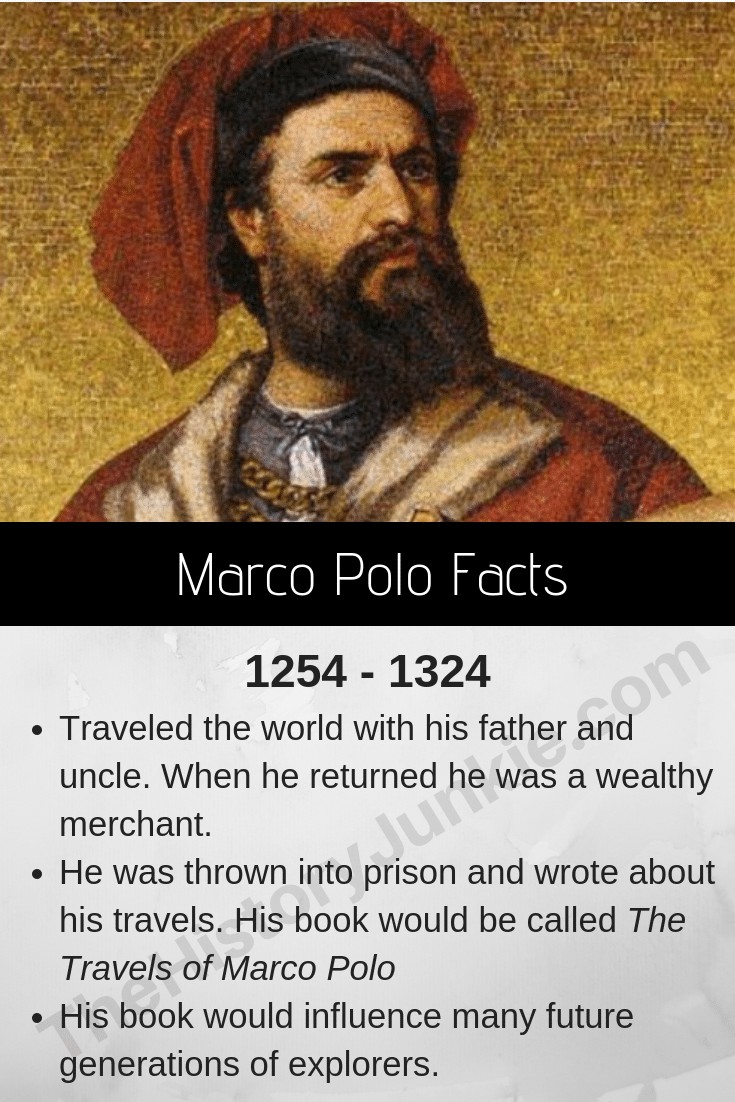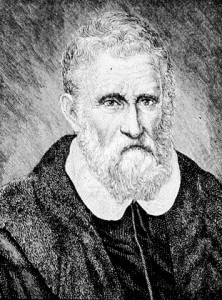Marco Polo (September 15, 1254 - January 9, 1324) was born to his father, Niccolo Polo, who was a wealthy merchant from Europe to the Eastern World.

Marco learned about the trade from his father and his uncle Maffeo and would take this knowledge and apply it. He would expand his father's wealth with his travels to China and would end up as a prisoner during a war between Venice and Genoa.
Here, he would tell his story to a writer who would end up publishing a book titled The Travels of Marco Polo. This book would become an influential work for future explorers who also wanted to acquire wealth from trade with India, China, and the rest of the Indies.
Christopher Columbus was especially influenced by these travels and sought to find a new route to the Indies. Instead, he would find a new world. Ironically, both he and Marco Polo died, never knowing that a New Continent existed.
Marco Polo's Early Years

Marco Polo was born to his father, Niccolo, and a mother who is unknown. His mother passed away early in his life, and while his father was on the road, he was raised by his aunt and uncle.
It would not be long until he joined his father and his uncle Maffeo in their travels.
Marco's father, Niccolo, and his uncle Maffeo were a visionary. During one of their voyages, Marco and Maffeo stopped in Constantinople and saw that change was coming.
At the time, Constantinople was part of the Byzantine Empire and remained as one of the most powerful cities in Europe. However, since the fall of Rome, Europe was in a state of constant war.
The feudal society developed into multiple factions that warred with each other. Rome, which had united the factions, had fallen sometime before.
Marco Polo traveled with Niccolo and Maffeo Polo. Niccolo was his father, and Maffeo was his uncle.
Niccolo and his brother Maffeo set off on a trading voyage before Marco was born and became very wealthy from their travels. According to the Travels of Marco Polo, Niccolo and Maffeo passed through much of Asia and eventually stopped in Constantinople.
During their stay, they foresaw political change and, liquidated their assets into jewels, and moved away.
According to the Travels of Marco Polo, they passed through much of Asia and met the Kublai Khan. During this time, Marco's mother passed away, and he was raised by an aunt and an uncle.
He would become well-educated and learned everything there was to know about being a merchant. Things such as foreign currency, appraising, and the handling of cargo ships. All would come in handy during his travels.
In 1269, Niccolo and Maffeo returned to Venice. Niccolo met his son for the first time.
In 1271, a seventeen-year-old Marco Polo set off for Asia with his father and uncle. They would return 24 years later with many riches. It is estimated that they traveled 15,000 miles.
Capture and Later Life
When the Polos returned to Venice, Venice was at war with Genoa.
Genoese admiral Lamba D'Oria defeated the Venetian fleet at the Battle of Curzola. During the battle, Marco Polo was taken prisoner.
While in prison, he met Rustichello da Pisa. He would spend quite a bit of time dictating his travels to Pisa. This would become the book The Travels of Marco Polo.
The Travels of Marco Polo became influential for many future explorers. Most notably, Christopher Columbus.
The Travels of Marco Polo was the first detailed account of the wealth of China to Europeans.
Polo was released from captivity in 1299. He would have been around 45 years old.
He returned to Venice, where his Father and Uncle had purchased a large home. He would conduct his business here and become one of the wealthiest merchants in the world.
He never left Venice again
In 1300, he married Donata Badoer.
Together, they had three daughters: Fantina, Bellela, and Moreta.
Death and Legend
In 1323, Polo was struck with an illness and was bedridden for most of that year.
Although Physicians did the best they could, Marco Polo died on January 8, 1324.
He divided his large portion into his family and other organizations.
Some are skeptical if Marco Polo ever really set foot into China or if it was all hearsay. He never mentions the Great Wall of China, which leads many to hesitate to believe him. However, the Great Wall of China is postdated about two centuries after the life of Marco Polo.
